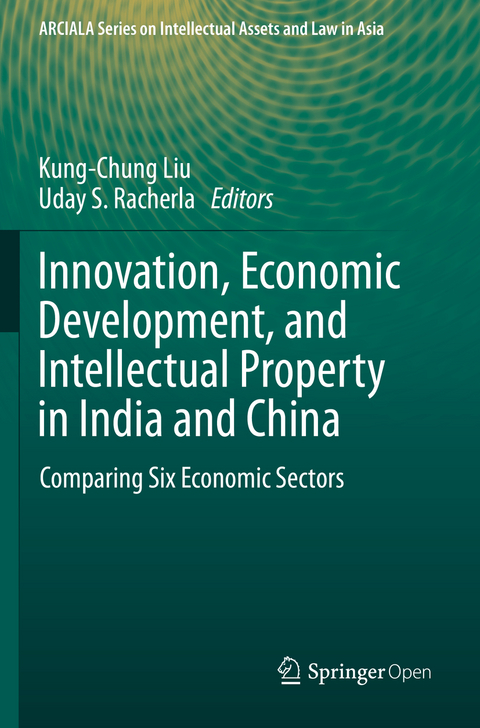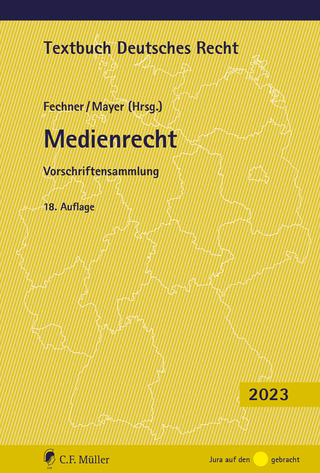
Innovation, Economic Development, and Intellectual Property in India and China
Springer Verlag, Singapore
978-981-13-8104-1 (ISBN)
The analysis extends beyond the domain of IP law, and includes economics and policy analysis. The overarching concern that cuts through all chapters is an inquiry into why certain industries have developed in one country and not in the other, including: the role that state innovation policy and/or IP policy played in such development; the nature of the state innovation policy/IP policy; and whether such policy has been causal, facilitating, crippling, co-relational, or simply irrelevant. The book asks what India and China can learn from each other, and whether there is any possibility of synergy.
The book provides a real-life understanding of how IP laws interact with innovation and economic development in the six selected economic sectors in China and India. The reader can also draw lessons from the success or failure of these sectors.
Kung-Chung Liu is Professor of Law at Singapore Management University, Singapore. His teaching and research interests are intellectual property law, antitrust and unfair competition law, communications law, and the interface between those disciplines, with a geographic focus on greater China and Asia. Uday Racherla was most recently Professor of Innovation & Intellectual Property Management at the Indian Institute of Technology Kanpur, India. He has worked at the highest levels of several Fortune 500 companies, managing the worldwide efforts of these companies on innovation, technology and business strategy, and managing their intellectual assets globally. His academic areas of interest include strategy, innovation and entrepreneurship, technology management, intellectual property management, and sustainability.
Chapter 1. Introduction, Summary and Some Inferences.- Part I: IP Codification and Innovation Governance.- Chapter 2. On The Necessity of Incorporating IP Laws Into the Civil Law of China and How.- Chapter 3.- Constitutional Governance in India and China and Its Impact on National Innovation .- Part II: IT Industry.- Chapter 4. Information Technology Industry in China .- Chapter 5. India's Information technology Industry: A tale of two Halves.- Part III: Film Industry.- Chapter 6. Chinese Film Industry under the Lens of Copyright, Policy and Market.- Chapter 7. Reminiscing about the Golden Age: An Analysis of Efforts to Revive the Hong Kong Film Industry through the Lens of Copyright Protection.- Chapter 8. Contemporary Challenges of Online Copyright Enforcement in India.- Chapter 9. Continued Economic Benefit to the Author: Royalties in the Indian Film Industry – Historical Development, Current Status, and Practical Application.- Part IV: Pharmaceutical Industry.- Chapter 10. Pharmaceutical Industry in China-Policy, Market and IP.- Chapter 11. Indian Patent Law and Its Impact on the Pharmaceutical Industry: What Can China Learn from India?.- Chapter 12. Historical Evolution of India’s Patent Regime and Its Impact on Innovation in the Indian Pharmaceutical Industry.- Chapter 13. The Challenges, Opportunities and Performance of the Indian Pharmaceutical Industry Post-TRIPS.- Part V: Plant Varieties and Food Security.- Chapter 14. Protecting New Plant Varieties in China and Its Major Problems.- Chapter 15. Genetically Modified Foods in China—Regulation, Deregulation or Governance?.- Chapter 16. Genetically Modified Plants: The IP and Regulatory Concerns in India.- Chapter 17. Rooting for Sustainable Agriculture and Food Security, Through Improved Regulatory Governance In India.- Part VI: Automobile Industry.- CHapter 18. Challenges in Reshaping the Sectoral Innovation System of the Chinese Automobile Industry.- Chapter 19. The Growth of the Indian Automobile Industry: Analysis of the Roles of Government Policy and Other Enabling Factors.- Part VII: The Culture of Sharing and the Sharing Economy.- Chapter 20. Development of the Sharing Economy in China Challenges and Lessons.- Chapter 21. Knowledge Sharing and the Sharing Economy in India.- Index.
| Erscheinungsdatum | 12.09.2020 |
|---|---|
| Reihe/Serie | ARCIALA Series on Intellectual Assets and Law in Asia |
| Zusatzinfo | 19 Illustrations, color; 21 Illustrations, black and white; XVII, 514 p. 40 illus., 19 illus. in color. |
| Verlagsort | Singapore |
| Sprache | englisch |
| Maße | 155 x 235 mm |
| Themenwelt | Recht / Steuern ► EU / Internationales Recht |
| Recht / Steuern ► Öffentliches Recht | |
| Recht / Steuern ► Privatrecht / Bürgerliches Recht ► Medienrecht | |
| Wirtschaft ► Betriebswirtschaft / Management ► Unternehmensführung / Management | |
| Wirtschaft ► Volkswirtschaftslehre | |
| Schlagworte | Automobile Industry • copyright protection • Economic Development • film industry • food security • free-trade agreement • Genetic Modification • Innovation • Innovation governance • Intellectual Property • IP codification • IT industry • open access • Patent • peer production • Pharmaceutical Industry • Royalties • Sharing Economy • TRIPs |
| ISBN-10 | 981-13-8104-6 / 9811381046 |
| ISBN-13 | 978-981-13-8104-1 / 9789811381041 |
| Zustand | Neuware |
| Haben Sie eine Frage zum Produkt? |
aus dem Bereich


